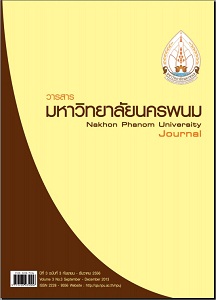การพัฒนาความเห็นอกเห็นใจผู้อื่นของนักศึกษา คณะศิลปศาสตร์และวิทยาศาสตร์ มหาวิทยาลัยนครพนม โดยใช้วิดีทัศน์การเรียนรู้จากตัวแบบสัญลักษณ์
Main Article Content
Abstract
การวิจัยครั้งนี้มีวัตถุประสงค์เพื่อ 1) เปรียบเทียบความเห็นอกเห็นใจผู้อื่นของนักศึกษาคณะศิลปศาสตร์และวิทยาศาสตร์ มหาวิทยาลัยนครพนม ที่ชมวิดีทัศน์การเรียนรู้จากตัวแบบสัญลักษณ์ ระหว่างก่อนและหลังการทดลอง 2) เปรียบเทียบความเห็นอก เห็นใจผู้อื่นของนักศึกษาคณะศิลปศาสตร์และวิทยาศาสตร์ มหาวิทยาลัยนครพนม หลังการทดลองระหว่างกลุ่มทดลองและกลุ่มควบคุม กลุ่มตัวอย่างในการวิจัยครั้งนี้ คือ นักศึกษาชั้นปีที่ 1 สาขาวิชาวิทยาศาสตร์ คณะศิลปศาสตร์และวิทยาศาสตร์ มหาวิทยาลัยนครพนม ที่เรียนรายวิชาจิตวิทยาสำหรับครู ภาคเรียนที่ 2 ปีการศึกษา 2555 จำนวน 76 คน นักศึกษาถูกสุ่มเพื่อเข้าร่วมกลุ่มทดลอง 1 กลุ่ม และ กลุ่มควบคุม 1 กลุ่ม โดยกลุ่มทดลอง ได้รับการพัฒนาความเห็นอกเห็นใจผู้อื่นโดยชมวิดีทัศน์การเรียนรู้จากตัวแบบสัญลักษณ์ และกลุ่มควบคุม ไม่ได้รับการฝึกใดๆ แต่ละกลุ่มมีจำนวนนักศึกษา 38 คน เครื่องมือที่ใช้ในการวิจัยครั้งนี้ คือ วิดีทัศน์การเรียนรู้จาก ตัวแบบสัญลักษณ์ และแบบวัดความเห็นอกเห็นใจผู้อื่น งานวิจัยนี้วิเคราะห์ข้อมูลโดยใช้การทดสอบทีทั้งแบบ Dependent และ Independent Samples ผลการวิจัยพบว่า 1) คะแนนความเห็นอกเห็นใจผู้อื่นของนักศึกษาคณะศิลปศาสตร์และวิทยาศาสตร์ มหาวิทยาลัยนครพนม ที่ชมวิดีทัศน์การเรียนรู้จากตัวแบบสัญลักษณ์ หลังการทดลองสูงกว่าก่อนการทดลองอย่างมีนัยสำคัญทางสถิติที่ ระดับ .05 2) คะแนนความเห็นอกเห็นใจผู้อื่นหลังการทดลองของนักศึกษากลุ่มทดลองและกลุ่มควบคุมไม่แตกต่างกันอย่างมีนัยสำคัญ ทางสถิติที่ระดับ .05
The purposes of this study were to: 1) compare the effects of video learning from symbolic models on development of empathy with people among undergraduate students, Faculty of Liberal Arts and Science, Nakhon Phanom University, between before and after the treatment, 2) compare the effects of video learning from symbolic models on development of empathy with people among undergraduate students, Faculty of Liberal Arts and Science, Nakhon Phanom University, after the treatment between experimental and control groups. The subjects were 76 first year undergraduate students majoring in science, who studied the psychology for teachers course, Faculty of Liberal Arts and Science, Nakhon Phanom University in the second semester of academic year 2012. Students were randomly assigned to one experimental group and one control group. Each group contained 38 students. The experimental group learned empathy with people from watching a learning video of symbolic models. The control group received no training. The instruments used in this study were a video for learning from symbolic models and a measure of empathy with people. The t-test of dependent and independent samples was employed for data analysis. The results revealed that: 1) the mean score of empathy with people among students of Faculty of Liberal Arts and Science, Nakhon Phanom University who watched a learning video from symbolic models after the treatment was significantly higher than that before the treatment at the .05 level; 2) the mean score of empathy with people after the treatment among students in the experimental group and the mean score of it among students in the control group were not found significantly different at the .05 level.


